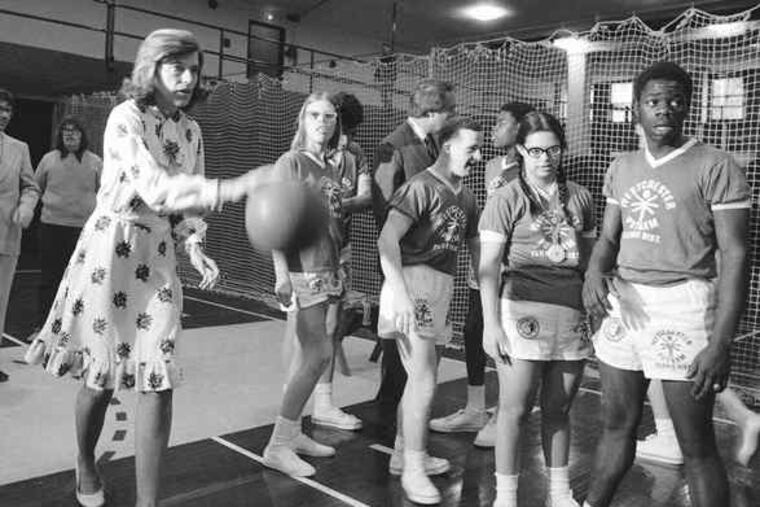Eunice Shriver, a life of inspiration
BOSTON - Eunice Kennedy Shriver, 88, the presidential sister who founded the Special Olympics and helped demonstrate that the mentally disabled can triumph on the field of competition and lead rich and productive lives, died yesterday.

BOSTON - Eunice Kennedy Shriver, 88, the presidential sister who founded the Special Olympics and helped demonstrate that the mentally disabled can triumph on the field of competition and lead rich and productive lives, died yesterday.
She had suffered a series of strokes in recent years and died at Cape Cod Hospital in the company of her husband, her five children, and her 19 grandchildren, her family said.
"She understood deeply the lesson our mother and father taught us: Much is expected of those to whom much has been given," said her sole surviving brother, Sen. Edward M. Kennedy, who is battling a brain tumor.
She was also the sister of President John F. Kennedy and Sen. Robert F. Kennedy; the wife of 1972 vice presidential candidate R. Sargent Shriver; the mother of former NBC newswoman Maria Shriver; and mother-in-law of California Gov. Arnold Schwarzenegger.
Mrs. Shriver was credited with helping to bring the mentally disabled into the mainstream and transforming America's view of them from institutionalized patients to friends, neighbors, and athletes.
Her efforts were inspired in part by the struggles of her mentally disabled sister, Rosemary, who was given a lobotomy at age 23 and spent the rest of her life in an institution. At the time, those with mental retardation were often a secret source of shame to their families and were quietly put away in institutions, out of sight and out of mind.
Mrs. Shriver revealed her sister's condition to the nation during her brother's presidency in a 1962 article for the Saturday Evening Post. "The truth is that 75 to 85 percent of the retarded are capable of becoming useful citizens with the help of special education and rehabilitation," she wrote. "Another 10 percent can learn to make small contributions, not involving book learning, such as mowing a lawn or washing dishes."
Realizing they were far more capable of playing sports than the experts said, Mrs. Shriver in 1968 started what would become the world's largest athletic competition for the mentally disabled. The first Special Olympics - a two-day event in Chicago - drew more than 1,000 participants from 26 states and Canada. Today, more than three million athletes in more than 160 countries participate in Special Olympics.
"She believed that people with intellectual disabilities could, individually and collectively, achieve more than anyone thought possible. This much she knew with unbridled faith," said her son Timothy, who now heads the Special Olympics.
President Obama said Mrs. Shriver would be remembered as "a champion for people with intellectual disabilities, and as an extraordinary woman who, as much as anyone, taught our nation - and our world - that no physical or mental barrier can restrain the power of the human spirit."
Mrs. Shriver was born in Brookline, Mass., the fifth of nine children to Joseph P. and Rose Fitzgerald Kennedy. She earned a sociology degree from Stanford University in 1943 after graduating from a British boarding school while her father was ambassador to England.
She was a social worker at a women's prison in Alderson, W. Va., and worked with the juvenile court in Chicago in the 1950s before taking over the Joseph P. Kennedy Foundation with the goal of improving treatment of the mentally disabled. The foundation was named for her oldest brother, who was killed in World War II.
In 1961, she pressed President Kennedy into establishing the first President's Committee on Mental Retardation.
In 1953, she married R. Sargent Shriver. He became JFK's first director of the Peace Corps, was George McGovern's running mate in 1972, and ran for president briefly in 1976.
Mrs. Shriver won many honors, including the nation's highest civilian award, the Presidential Medal of Freedom, in 1984.
"When the full judgment on the Kennedy legacy is made - including JFK's Peace Corps and Alliance for Progress, Robert Kennedy's passion for civil rights and Ted Kennedy's efforts on health care, workplace reform and refugees - the changes wrought by Eunice Shriver may well be seen as the most consequential," Harrison Rainie, author of Growing Up Kennedy, wrote in a 1993 article.
Survivors include her husband, who was diagnosed with Alzheimer's disease in 2003, and the couple's children: Maria; Timothy; Robert, a Santa Monica city councilman; Mark, an executive at the charity Save the Children; and Anthony, founder and chairman of Best Buddies International, a volunteer agency for the mentally disabled.